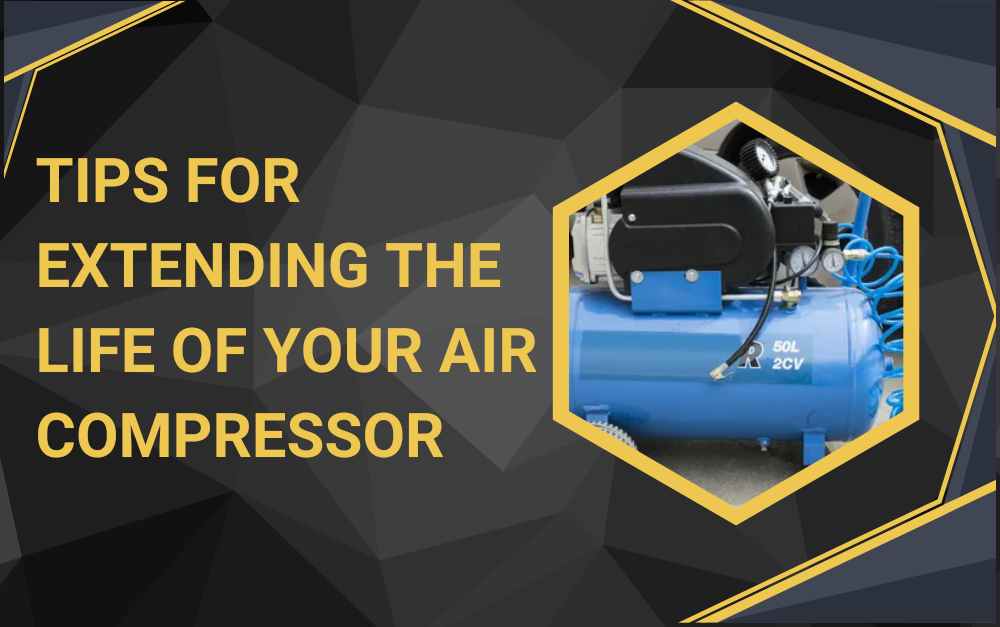Air compressors are essential tools in many industries. They power various tools and equipment, making work more efficient. However, like all machines, air compressors need proper care and maintenance to ensure they last a long time. In this blog, we will share simple tips to help you extend the life of your air compressor. By following these tips, you can save money on repairs and replacements and keep your compressor running smoothly.
Understanding Your Air Compressor
Before we dive into the tips, it’s important to understand what an air compressor does. An air compressor converts power into potential energy stored in pressurized air. This air can then be used to power tools, inflate tires, and perform many other tasks. Knowing how your air compressor works will help you maintain it better.
ADDITION : Need reliable and efficient air compressors for your next project? Look no further! Our Air Compressor Rental services offer top-of-the-line equipment to meet all your needs. Don’t let equipment downtime slow you down – contact us today to get the best air compressors delivered to your site quickly and hassle-free.
How Does an Air Compressor Work?
An air compressor takes in air from the environment, compresses it, and stores it in a tank. When you need to use the air, it is released through a hose at a high pressure. There are different types of air compressors, including piston compressors, rotary screw compressors, and centrifugal compressors. Each type has its own maintenance needs, but the tips we will discuss can apply to all types.
Regular Maintenance is Key
The most important thing you can do to extend the life of your air compressor is to perform regular maintenance. This includes checking and replacing parts, cleaning the machine, and monitoring its performance. Regular maintenance can prevent small problems from becoming big ones and keep your compressor running efficiently.
Check and Change the Oil
Just like a car engine, an air compressor needs oil to run smoothly. The oil lubricates the moving parts and reduces friction, which can cause wear and tear. Check the oil level regularly and change it according to the manufacturer’s recommendations. Using the right type of oil is also important. Make sure to use the oil specified in the manual for your compressor.
Replace Air Filters
Air filters keep dirt and debris from entering the compressor. If the air filter gets clogged, the compressor has to work harder, which can cause damage over time. Check the air filter regularly and replace it when it looks dirty. A clean air filter will help your compressor run more efficiently and last longer.
Drain the Moisture from the Tank
As the air is compressed, moisture from the air can accumulate in the tank. This moisture can cause rust and damage the tank if it is not drained regularly. Most compressors have a valve at the bottom of the tank for draining moisture. Open this valve regularly to release any accumulated water.
Keep the Compressor Clean
Keeping your air compressor clean can also extend its life. Dust and dirt can build up on the machine, causing it to overheat and wear out faster. Wipe down the exterior of the compressor regularly and clean any vents or cooling fins to ensure proper airflow.
Protect Against Overheating
Overheating is a common cause of compressor failure. Make sure your compressor has adequate ventilation and is not placed in a hot, enclosed space. If you use your compressor heavily, consider installing a cooling system to keep it from overheating.
Use the Right Tools and Accessories
Using the right tools and accessories with your air compressor can make a big difference in its performance and lifespan. Always use tools that are compatible with your compressor and follow the manufacturer’s guidelines for operation.
Avoid Overworking the Compressor
Every air compressor has a maximum pressure rating. Do not exceed this rating, as it can cause the compressor to overheat and fail. If you need more pressure, consider getting a larger compressor rather than pushing your current one beyond its limits.
Store the Compressor Properly
Proper storage can also help extend the life of your air compressor. When not in use, store the compressor in a clean, dry place. Cover it with a tarp or other protective cover to keep dust and dirt off.
Protect from Cold Weather
If you live in a cold climate, take extra precautions to protect your compressor from freezing temperatures. Cold weather can cause the oil to thicken and make it harder for the compressor to start. Store the compressor in a heated space if possible, or use a heater to keep it warm.
Monitor for Problems
Regularly monitoring your air compressor for problems can help you catch issues early and prevent costly repairs. Listen for unusual noises, check for leaks, and pay attention to how the compressor is performing. If you notice any problems, address them right away.
Perform Regular Inspections
Schedule regular inspections of your air compressor to ensure everything is in good working order. Check the belts, hoses, and connections for wear and tear, and replace any parts that are damaged. Regular inspections can help you catch small problems before they become big ones.
Conclusion
By following these simple tips, you can extend the life of your air compressor and keep it running smoothly. Regular maintenance, proper cleaning, and using the right tools and accessories can make a big difference. Remember to monitor your compressor for problems and address them promptly to avoid costly repairs. With a little care and attention, your air compressor can provide years of reliable service.
For more insightful articles related to this topic, feel free to visit repurtech
